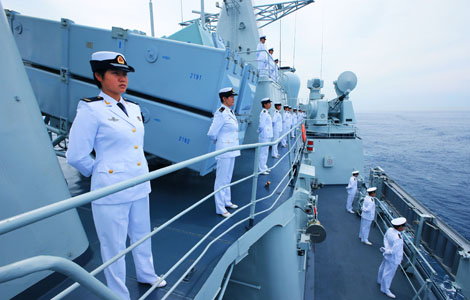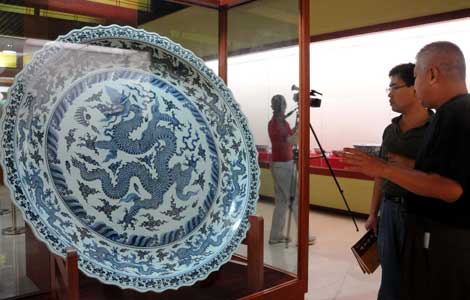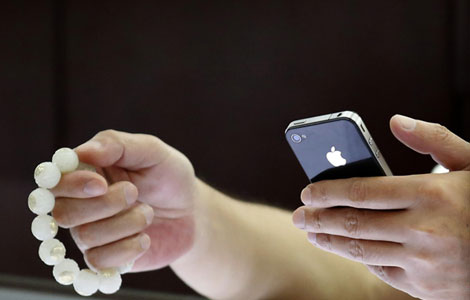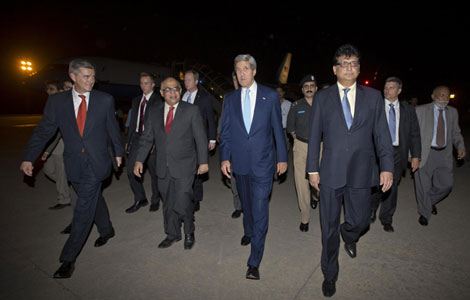Cooperation of mutual benefit
Updated: 2013-08-02 07:08
By Huang Guobo (China Daily)
|
||||||||
According to the Center for Global Development, a US think-tank, between 2000 and 2011 China provided $75 billion in aid to Africa, helping it build roads, bridges, hospitals, and schools and to drill wells and nurture more than 40,000 talents. For example, China established six cooperative economic and trade zones in five African countries to develop the processing industries, creating more than 10,000 jobs for local people. The power plant in which it invested in Ghana generates 15 percent of the total electric power in the country. The telecommunications network it built in Ethiopia has raised the coverage of the country's communications from nearly zero to 64 percent. The China-Nigeria Friendship Primary School built with Chinese donations has eased pressures for elementary education from 300 villages, its charities in Sudan have benefited more than 2 million people, and the China-sponsored occupational training centers in Angola and Libya have trained a large number of people. China also provides loans and debt reductions or exemptions in support of African development.
China lags far behind the developed countries in terms of its volume of trade and investment in Africa but its trade and investments have a more balanced structure.
China is not a major player in Africa's resources and energy markets. Statistics reveal that China's direct investments in oil, gas, and mineral resources constitute less than one-third of its total direct investments in Africa, whereas they account for 70 percent of the investment from France, 59 percent of the investment from the United States, and 47 percent that of the United Kingdom. Of the foreign investment in Africa's oil, gas, and mineral resources industries, 70 percent comes from the US, the UK, France, Australia and Canada combined, whereas less than 10 percent is from China. Oil exports to China account for only 18 percent of Africa's total oil exports, well below the amount exported to the EU and the US.
As of the end of 2011, China contributed 3 percent to the international investment position and 7 percent to investment flows in Africa.
Chinese enterprises are at a disadvantage, compared to those from the developed countries, in terms of seeking investments in Africa as China is a relatively new investor in the continent and some of the developed countries have language and culture advantages. Chinese businesses, as latecomers, do not have much choice in terms of selecting investment projects and the conditions for investments may not be very favorable.
The facts are irrefutable proof that trade and economic cooperation between China and Africa is mutually beneficial. Through the development of their cooperation China and Africa can offer more opportunities to each other. But to deepen their cooperation, Chinese businesses need to better understand the needs of the African people so as to strengthen their knowledge of the laws, cultures, and customs in Africa and better perform their social responsibilities in terms of environmental protection, local employment, building a corporate image, and delivering technical training to match and serve the local people in the ways they desire. African countries also need to enhance their communication with Chinese businesses to deepen mutual understanding, create a favorable environment for trade and investment and ensure the legal rights and interests of Chinese businesses.
On his recent trip to Africa President Xi Jinping conveyed the Chinese people's best wishes and willingness to work together with the African people, announcing to the world that China will always be Africa's "all-weather" friend and partner, setting the direction for the future development of their relations. China and Africa should keep up with the times, ignore distractions, and jointly concentrate on advancing trade and economic cooperation to a higher level.
The author is chief economist of the State Administration of Foreign Exchange.
(China Daily 08/02/2013 page8)

 Snowden granted 1 year's temporary asylum in Russia
Snowden granted 1 year's temporary asylum in Russia
 China sails through 'first island chain'
China sails through 'first island chain'
 City's visa-free offer gets first takers
City's visa-free offer gets first takers
 Property prices rise again
Property prices rise again
 One-stop service offers new hope
One-stop service offers new hope
 Private museums increasingly under spotlight
Private museums increasingly under spotlight
 Apple CEO met China Mobile head, talked co-op
Apple CEO met China Mobile head, talked co-op
 Kerry in Pakistan on unannounced visit
Kerry in Pakistan on unannounced visit
Most Viewed
Editor's Picks

|

|

|

|

|

|
Today's Top News
Snowden granted 1 year's temporary asylum in Russia
China sails through 'first island chain'
US rethinking Putin summit
Property prices rise again
China 'to add more to global growth'
Nation 'confident' on trade
Snowden has entered Russia: lawyer
China opposes US resolution
US Weekly

|

|







